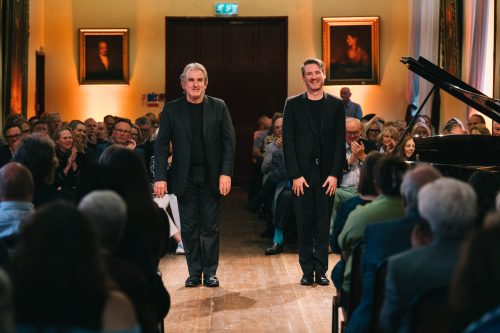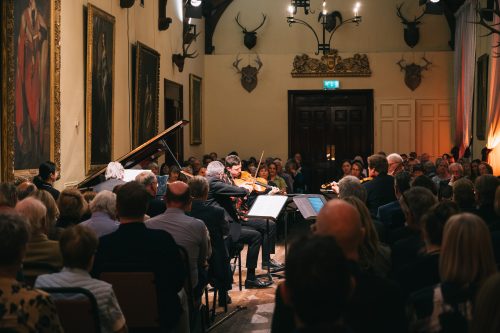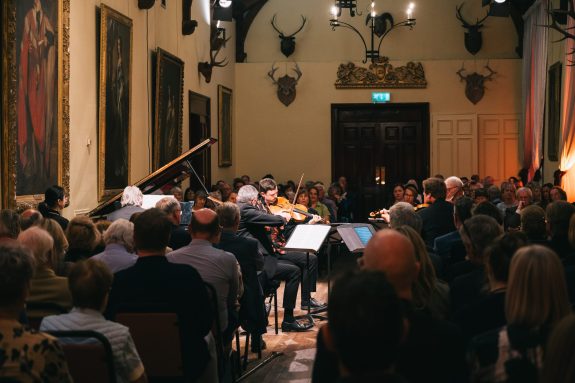 United Kingdom Clandeboye Festival 2024 [1] – Schubert, R. Schumann: Barry Douglas (piano), Michael McHale (piano), Andrey Baranov, Michael D’Arcy (violins), Ed Creedon (viola), Arto Noras (cello), Clandeboye Festival, Clandeboye Estate, Northern Ireland, 17.8.2024. (RB)
United Kingdom Clandeboye Festival 2024 [1] – Schubert, R. Schumann: Barry Douglas (piano), Michael McHale (piano), Andrey Baranov, Michael D’Arcy (violins), Ed Creedon (viola), Arto Noras (cello), Clandeboye Festival, Clandeboye Estate, Northern Ireland, 17.8.2024. (RB)

Schubert – Fantasia in F minor for piano four hands, D940
R. Schumann – Märchenbilder, Op.113; Piano Quintet in E-flat major, Op.44
This year the Clandeboye Festival is celebrating its 23rd year. It is also the 25th anniversary of Camerata Ireland – an orchestra which brings together the most talented musicians from across Northern Ireland and the Republic of Ireland. This initiative was inspired by the Good Friday Agreement of 1998. The theme of this year’s Festival is ‘Colourful Connections’ to reflect the fact that we are all connected, humanly and culturally, in these uncertain times. This was the opening concert of the festival and it featured music by Schubert and Robert Schumann.
The concert opened with Schubert’s Fantasia in F minor for piano four hands which was written in the last year of the composer’s short life. The work is divided into four interconnected movements which are played without a pause, and which mirror the traditional sonata movements. Barry Douglas and Michael McHale gave a highly accomplished performance of this great staple of the repertoire. Douglas brought a silky touch to the haunting opening melody while the tonal ambiguity and modulations were deftly handled. Both players brought impressive dynamic contrasts and rich and varied tone colours to the Largo second movement. Some of the entries could have been a little more tightly coordinated. The Scherzo was clean and crisp and the interplay between the two players was excellent. The tempo was a little slow for my taste, but it worked well nevertheless and allowed for close attention to the composer’s detailed articulation and markings. Douglas and McHale were not as closely integrated as they might have been in the opening section of the fugal finale. Having said that they allowed the movement to build to an impressive climax with each new theme emerging seamlessly from the rich textures.
McHale joined forces with violist Ed Creedon for a performance of Schumann’s Märchenbilder (‘Fairy Tale Pictures’). This is a relatively late work, composed in March 1851, and it depicts the two fictional sides of the composer’s personality, Eusebius and Florestan. Both players succeeded in evoking warm autumnal colours tinged with melancholy in the opening movement. The character of Florestan came brilliantly to the fore in the buoyant second movement with its dotted rhythms and ebullient energy. Creedon brought virtuoso flair to the restless semiquavers which open and close the third movement. I loved the gorgeous tone which Creedon evoked from the bottom of the register in the final movement, which he and McHale transformed into a magical lullaby.
The final work on the programme was Robert Schumann’s Piano Quintet which was written in 1842, arguably one of the most creative years in the composer’s life. Schumann was the first composer to write for this combination of piano and string quartet. Schumann’s wife, Clara, gave the first public performance of the demanding piano part and was closely associated with the piece. It has established itself as one of the finest and most performed piano quintets in the entire repertoire.

Douglas was joined by the four string players for this performance. There was a close rapport and shared understanding of the work throughout the performance. The opening section was bright and brilliant before giving way to meltingly beautiful cantabile playing from Ed Creedon and Arto Noras. Douglas gave an adrenaline-fuelled performance of the virtuoso figurations in the development section. The opening section of the second movement was desolate and spare as we suddenly found ourselves walking in a funeral procession. All five players subsequently combined to produce music of intense yearning, regret and suppressed passion. The rushing scales of the Scherzo were dispatched with exuberance and power – I was impressed that Douglas was able to achieve weight and depth of sound while maintaining such a rapid pace. All five players seemed to relish the rapid fire second trio with the gypsy fire semiquavers dispatched with brilliance. The musicians succeeded in achieving an impressive range of textures and sonorities in the finale. The fugal writing was skilfully handled and tightly coordinated before the music came to a triumphant conclusion.
This was a first-rate concert and the performance of the Schumann Piano Quintet in particular was outstanding. It was deservedly greeted with a standing ovation from the audience.
Robert Beattie
